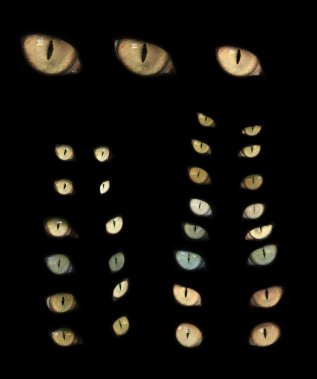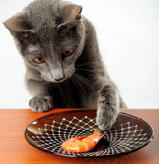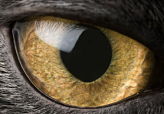Cat Eye Problems

Cat eye problems are not really common because cats generally have good eyes and the most common eye problems for cats is injury, not disease. A lot of the injuries are the result of fights. If you see your cat has an eye injury it's best to take it to the vet. If left untreated, an infected scratch can lead to corneal ulcers or other complications.
Detecting an ocular problem in your cat is as simple as looking him straight in the eyes. Look for cloudiness, redness, squinting, discharge and vision problems. If you notice any of these signs then take your cat to the vet. To check for eye damage, your vet will examine your cat's eyes through an ophthalmoscope.
The scope will reveal if the eye's outer surface (cornea) is scratched or if there is inflammation, ulceration, or cloudiness in tissues within the eye. Your vet may also administer a few drops of special stain...which reveals corneal ulcers under ultraviolet light. For serious or difficult to diagnose problems, your vet may refer you to a veterinary specialist in ophthalmology.
Many cat eye problems start with irritation of the cornea. Sometimes, the vet can solve the problem by flushing the eye to remove foreign matter. But if the cornea is scratched, as often happens when a cat is clawed in the eye, the area may become infected and develop a corneal ulcer or an inflammatory condition called keratitis. Vets usually treat these conditions with topical eye ointments or drops. A selection is available from reliable vendors listed on the Pet Products Page
An especially common cause of cat eye problems is feline herpes-virus. Herpes-virus infection is best known for causing the respiratory disease rhinotracheitis, but the virus can also attack the cornea and the conjunctiva (the inside surface of the eyelids and the white of the eye), leading to conjunctivitis. Choosing the right treatment for conjunctivitis can be tricky because many cases are caused by agents other than herpes-virus, such as chlamydia, a bacterium.
So, your vet may recommend first running a polymerase chain reaction (PCR)to verify herpes infection. And if the culprit is herpes-virus, you may have to treat your cat several times during her lifetime. Herpes-virus doesn't go away. It stays latent, usually in the nerves of the eye, and then at times of stress the virus particles are shed again and cause conjunctivitis and upper respiratory infection. Prompt treatment will usually keep these herpes flare-ups from causing any lasting damage.
As mentioned in the above paragraph, there are other cat eye problems or afflictions in cats. Conjunctivitis is an inflammation of the conjunctiva, the membrane that lines the eyelids and covers the exposed part of the eyeball. So, if you notice redness or swelling of your cat's eyes, or if your cat's third eyelid is showing, you should suspect conjunctivitis and call your vet.
Buy your Pet's Ear and Eye Care Medicine at Chewy Pharmacy!More serious cat eye problems are inflammations of the uvea, the eye's vacular (blood vessel) layer, including the iris, ciliary body and charoid tissues. Uveitis happens in the eye. Your vet will probably recommend blood tests for some of the causes such as toxoplasmosis, feline leukemia virus FeLV), feline infectious peritonitis (FIP) , and feline immunodeficiency virus (FIV). To treat uveitis, a vet may have to treat an underlying condition. Vets usually treat uveitis with anti-inflammatory drugs, but unfortunately, the treatment isn't always successful.
Corneal sequestration, a deposition of brown or black pigment on the surface of the cornea, is a condition unique to cats. Most commonly it happens in Persians and Himalayan cats. This is treated with medication or sometimes surgery; and sometimes, a soft contact lens is used to protect the eye as it heals. The lens is usually left on for 2-3 weeks.
Cat eye problems such as Glaucoma, is where the fluid pressure within the eyeball becomes elevated and can have many possible causes. If left untreated, the condition can cause blindness. Signs of glaucoma include a bulging eyeball, cloudiness in the cornea, or a pupil that does not contract. Treatment varies depending on the cause. Sometimes cats can also get cataracts, a clouding of the lens that gradually obscures sight.
Cataracts are relatively rare in cats. Felines suffer only rarely from diabetes-induced cataracts, and though inherited congenital cataracts do exist in Burmans, Himalayans, Persians, and British Shorthairs, the incidence is low and the cataracts are often small enough to be ignored. See Cat Cataracts.
For certain eye problems...such as entropion, a congenital defect wherein the eyelids fold under...surgery is the answer. Surgery can also cure a corneal sequestrum...an island of dead corneal cells that forms in some breeds with prominent eyes.
A cat's natural diet...fresh meat...contains an amino acid, taurine, that is essential to a cat's health. A diet deficient in taurine can lead to heart problems and retinal atrophy (also called feline central retinal degeneration), a disease that causes blindness. Fortunately, major pet-food companies supplement cat food with taurine.
If, through accident or illness, your cat should lose its sight you should be aware that blind cats function extremely well. They navigate quite well by using their ears, nose and whiskers. They can even jump off and on furniture after their initial adjustment to the limitation, so don't rearrange the furniture.
Related Articles......
Return from Cat Eye Problems to Cat Heath Homepage
Having trouble finding what you need? Cat Health Index & Site Map
OR
Do you have a question to ask?...Questions
OR
Do you have a cat story to share?...Simply click here to go to that page!
Copyright@2010-2020 All rights reserved.Cat-health-detective.com
This website is information only. Consult a veterinarian for medical assistance

"Like Us" on Facebook
or...
"Like Us" here




















